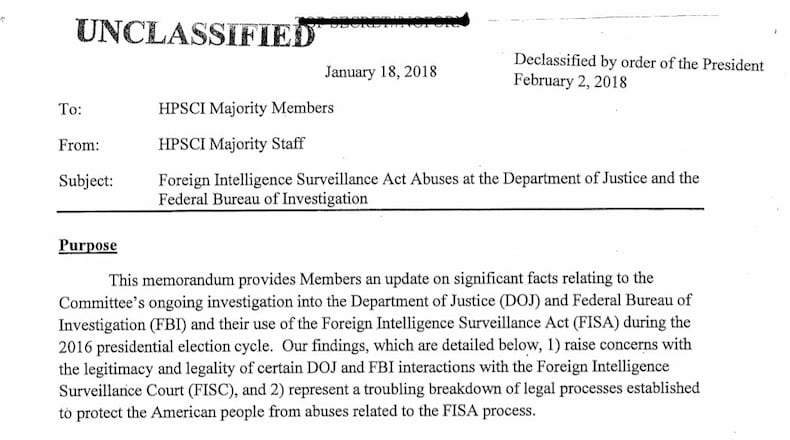After several weeks of an intense campaign by Republicans, President Donald Trump on Friday authorized the release of a GOP intelligence memo, which describes some of the background on the FBI investigation into Russian interference in the 2016 elections, as many Republicans said the details showed unethical behavior and bias inside the FBI and Justice Department.
"I think it's terrible, you want to know the truth? I think it's a disgrace," President Trump said to reporters in the Oval Office.
While Republicans in Congress echoed that assessment, saying it called into question the legality of the FBI investigation, Democrats said it was a political stunt.
"The Memo was about as explosive as Geraldo’s “Al Capone’s vault,"" said Rep. Gerry Connolly (D-VA).
If you are curious, you can read the full GOP memo, and letter from the President, at this link.
Here are some of the notable items inside the GOP memo:
1. The GOP memo is all about Carter Page. While Republicans had talked about the memo as if it would undermine a big chunk of the Trump-Russia investigation, it only focuses on one small part, that involving Carter Page, who was once a foreign policy adviser to the Trump Campaign. Page attracted attention when he went to Moscow in July of 2016 - in part, because he had been an FBI focus back in 2013, during an investigation of a Russian spy ring in New York City. Back then, the feds were concerned that Page was being recruited by Russian intelligence agents. So, if you were looking for a broad indictment of FBI actions, that wasn't in this memo - it's all about Carter Page, something Democrats were happy to immediately note.
2. The Steele Dossier did not trigger Trump-Russia probe. In attacking the work of British intelligence agent Christopher Steele, Republicans have correctly pointed out that he was being paid with money coming from the Democratic Party, funneled through a friendly law firm, and then to the group Fusion GPS - as GOP lawmakers have hinted this entire Russia investigation was basically sparked by that opposition research. But on the final page of this GOP memo, Republicans clearly say that information about another Trump foreign policy adviser, George Papadopoulos, "triggered the opening of an FBI counterintelligence investigation in late July 2016" - not information from Steele. That was reported around Christmas by the New York Times, but denounced by many Republicans as an effort to downplay the Steele Dossier. Instead, we now have the answer from the GOP - the Dossier did not start the Trump-Russia probe.
3. Surveillance on Page started after he left Trump campaign. While the feds took note of Page's July 2016 trip to Moscow, the FBI did not ask for a surveillance warrant until weeks before Election Day. And by the time that FISA surveillance warrant was approved - October 21, 2016 - Carter Page was no longer associated with the Trump campaign. In early August, as question surfaced about Page's trip to Russia, the Trump campaign had downgraded Page to an "informal adviser." In September, Page was no longer on the Trump team officially. So, surveillance of Page didn't include the time that he was affiliated with President Trump's campaign. Also important is that when he testified before the House Intelligence Committee, Page was asked if he had been in touch with a number of important Trump officials, including the President. The answer was "no" to most of those names, including Mr. Trump.
4. What exactly were the "grave concerns" of the FBI? Earlier this week, the FBI expressed strong opposition to the release of this GOP memo, using the phrase 'grave concerns.' But remember - it wasn't 'grave concerns' about the actual information that was being released, but it was "grave concerns about material omissions of fact that fundamentally impact the memo's accuracy." So, what the FBI was saying is that - in their opinion - the GOP memo was only painting part of the story as it applies to the surveillance of Carter Page. As one former CIA official noted on Twitter, all of the questions about what evidence was shown to the FISC court could be answered easily by President Trump.
5. The future of the Deputy Attorney General. One of the big points in the buildup to the release of this memo was a drumbeat about the future of Deputy Attorney General Rod Rosenstein. But there really isn't anything in the memo about him, other that the fact that he approved one extension of the FISA surveillance on Page, soon after Rosenstein was confirmed by the Senate in March of 2017. Rosenstein was not in his current position, and did not participate in any of the decision making related to Page - or the Russia probe - until he took his post in the Trump Administration. Asked if he had confidence in Rosenstein, President Trump said, "You figure that one out. The scowl on his face does give the likely answer.
6. What about the information behind the memo? One thing this memo did not have was any sourcing materials to back up the various claims made by the GOP. It would be nice to see the FISA application for a warrant on Page. What other information was presented by the FBI? When the FISA warrant was extended, what kind of evidence had been picked up by surveillance during those 90 day periods? Obviously, the intelligence community doesn't hand out stuff like that - but it would be nice to see. For Republicans, it was still important to get out the basics.
About the Author


